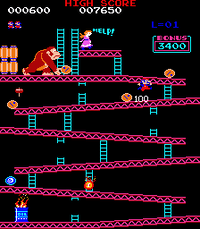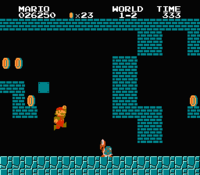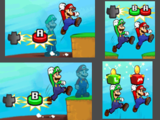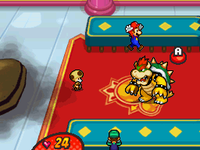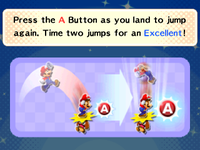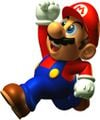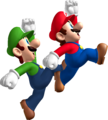Jump: Difference between revisions
m (→Super Jump) |
AgentMuffin (talk | contribs) No edit summary |
||
| (552 intermediate revisions by more than 100 users not shown) | |||
| Line 1: | Line 1: | ||
[[ | {{about|the uses of jumping throughout the Mario franchise|the attack from the ''[[Paper Mario (series)|Paper Mario series]]'' known as "Jump"|[[Boots]]}} | ||
''' | [[File:SMBW Mario Jump.png|thumb|200px|[[Mario]] jumping]] | ||
{{quote|As you know, the primary action for mobile creatures is the jump, if you follow.|Stuffwell|Mario & Luigi: Partners in Time}} | |||
The generic '''jump''' is one of the most common moves in the [[Super Mario (franchise)|''Super Mario'']] franchise, usually indicated by a pose with a raised fist and split legs. | |||
In | In the original ''[[Donkey Kong (game)|Donkey Kong]]'' game, [[Mario]]'s jump can only dodge [[:Category:Hazardous objects|obstacles]] and collect items. Later games added the ability to hit [[Floor (Mario Bros.)|platforms]] and [[block]]s from below for beneficial results, and to [[stomp]] on many [[List of enemies|enemies]] and [[:Category:Switches|switches]] while falling. This promoted jumping to a primary method of attack and interaction in the franchise, in addition to a form of locomotion, giving it various purposes across [[genres]]. | ||
In the early games, Mario keeps his legs split when landing on enemies to stomp them; in later games, Mario commonly lands on enemies by using his shoes. | |||
Because Mario can jump in most games of the [[Super Mario (franchise)|''Super Mario'' franchise]], only significant examples are mentioned. | |||
=== | ==History== | ||
===''Donkey Kong''=== | |||
[[File:Donkey Kong Arcade 25m Screenshot.png|thumb|left|Mario jumping over a barrel in ''Donkey Kong'']] | |||
In the original arcade version of ''Donkey Kong'', Mario has to jump over the [[barrel]]s that [[Donkey Kong]] throws at him. He can only jump high enough to leap right over the barrel, in contrast to the impossibly high jumps in the ''Super Mario Bros.'' series. If Mario lands on a barrel in the game, he dies. In the early concept of ''Donkey Kong'', Mario originally was not able to jump. It was implemented when [[Shigeru Miyamoto]] and his team thought, "If you had a barrel rolling towards you, what would you do?"<ref>[https://iwataasks.nintendo.com/interviews/#/wii/nsmb/0/0 Iwata Asks - New Super Mario Bros: Volume 1] ''Nintendo''. Retrieved June 6, 2010.</ref> | |||
In the [[Game Boy]] [[Donkey Kong (Game Boy)|version]], Mario has a greater variety of moves related to jumping. If the player jumps then presses down on {{button|gb|Pad}}, Mario does a handstand. From the handstand position, Mario could perform high jumps and wide jumps depending on the situation. Mario could also backflip by walking and then immediately pressing the opposite direction and the jump button, resulting in him going high into the air backwards. Unlike all other 2D Mario titles, ''Donkey Kong'' also punishes the player for falling too far, resulting in Mario losing a life. This jump system has also been used in ''[[Mario vs. Donkey Kong]]''. | |||
{{br}} | |||
===''Mario Bros.''=== | |||
In ''[[Mario Bros. (game)|Mario Bros.]]'', jumping is the primary attack of Mario and Luigi and the only way to defeat [[List of enemies|enemies]]. By jumping from below to hit the platforms on which the enemies stand, the player can stun the enemies or turn them around. The enemies then have to be finished off with a kick. Unlike later games, stomping on enemies is deadly in ''Mario Bros.'' Because of this, the [[Shellcreeper]]s have been changed to [[Spiny|Spinies]] in all remakes of the game to remind players not to stomp on them. | |||
{{br}} | |||
=== | ===[[Super Mario (series)|''Super Mario'' series]]=== | ||
[[File:SMAS SMB3 Small Mario Jumping.png|thumb]] | |||
Since ''[[Super Mario Bros.]]'', jumping has been a much more integral part of the [[Super Mario (franchise)|''Super Mario'' franchise]], and is no longer used solely to jump over gaps and enemies. In later games of the series, Mario and other playable characters use a greater variety of jump moves which can be used to reach certain areas or get bonus [[List of items|items]] from special [[block]]s. These include the [[Spin Jump]] from ''[[Super Mario World]]'', the [[Ground Pound]] first seen in ''[[Super Mario World 2: Yoshi's Island]]'', and even the [[Double Jump (consecutive)|Double Jump]], [[Triple Jump]], and [[Wall Jump]] introduced in ''[[Super Mario 64]]''. | |||
=== | ====''Super Mario Bros.''==== | ||
[[File:SMB-World1-2-UndergroundJump.png|thumb|Mario jumping in ''Super Mario Bros.'']] | |||
''[[Super Mario Bros.]]'' features various types of [[Brick Block]]s which Mario can find [[coin]]s in, as well as [[? Block]]s that contain [[Super Mushroom|Magic Mushroom]]s and [[Fire Flower]]s. To break these blocks, the player must jump while under them. Mario can also defeat enemies like [[Goomba|Little Goomba]]s and [[Hammer Bro]]thers by [[stomp]]ing on them. [[Koopa Troopa]]s are not defeated by the stomp, but hide in their [[Green Shell|Shells]], which can then be kicked by the player. Hammer Brothers, [[Cheep Cheep|Cheep-cheep]]s, [[Impostor Bowser|fake Bowsers]], and [[Bowser]] himself all jump in the game as well. | |||
=== | ====''Super Mario Bros. 2''==== | ||
[[ | In ''[[Super Mario Bros. 2]]'', jumps served a different purpose than in all other games, due to the game using the only slightly altered ''[[Yume Kōjō: Doki Doki Panic]]'' as its engine. The characters in the game could not defeat any enemies by stomping on them. Instead, they could stand on them and pick them up by pressing {{button|nes|b}}. Players could even land on [[Birdo]]'s [[Birdo's Egg|eggs]] and throw them at Birdo. Enemies and items could be picked up and thrown to knock out other enemies. This system has been carried over to ''Donkey Kong'' on the Game Boy. | ||
====''Super Mario World''==== | |||
While the standard jump (or '''Regular Jump''')<ref>Super NES Nintendo Player's Guide, page 15.</ref> remains mostly unchanged in ''[[Super Mario World]]'', Mario is also now capable of [[Spin Jump|spin-jump]]ing. It trades height for offense, as it can break blocks (as [[Super Mario (form)|Super Mario]]) and destroy enemies that are usually more durable. It also allows Mario to bounce off certain enemies, notably those with spines, where he would usually take damage. | |||
''Super Mario World'' is the debut of [[Yoshi]], a dinosaur-like creature Mario can ride. His jump is greater than Mario's, but it defeats enemies as quickly as the Spin Jump, and Yoshi even bounces on spiny enemies, too. While on Yoshi, Mario or Luigi can perform a '''Yoshi Boost'''<ref>''[[Mario Mania]]'' Nintendo Player's Guide, page 43.</ref> (also named '''Double Jump'''),<ref>Super NES Nintendo Player's Guide, pages 13 and 15.</ref> which gives him a second, higher jump off Yoshi. Doing so leaves Yoshi alone unless Mario or Luigi hops back onto him. | |||
====''Super Mario World 2: Yoshi's Island''==== | |||
[[File:SMW2 Flutter Jump.png|thumb|left|100px|Yoshi using the Flutter Jump to land slowly]] | |||
The playable appearance of Yoshi, ''[[Super Mario World 2: Yoshi's Island]]'', introduces multiple aspects on top of the jump. By holding the jump button, Yoshi will [[Flutter Jump]], which stalls him momentarily, allowing for careful landings and covering greater distances. Pressing down makes him [[Ground Pound]], an offensive move that is stronger than landing on enemies. These are all new to the franchise, with Ground Pounding becoming a staple of ''Super Mario Bros.'' games, and Flutter Jumping being an iconic move of Yoshi's. | |||
[[ | ====''Super Mario Sunshine''==== | ||
In ''[[Super Mario Sunshine]]'', Mario's jump can defeat most enemies. When using [[F.L.U.D.D.|FLUDD]]'s [[Hover Nozzle]], Mario can float higher and longer. Additionally, if Mario jumps over a [[pit]], his jumps are different.{{ref needed}} | |||
{{br}} | |||
=== | ===''Mario Kart'' series=== | ||
[[ | [[File:BowserTrickSide.png|thumb|150px|[[Bowser]] doing a trick off a net]] | ||
Throughout most games in the ''[[Mario Kart (series)|Mario Kart]]'' series, players can make a short [[hop (move)|hop]] to begin a [[drift]]. ''[[Super Mario Kart]]'' and ''[[Mario Kart: Super Circuit]]'' feature many narrow hazards that can be hopped over, such as puddles or cracks in the road. Otherwise, the series generally implements [[Dash Panel]]s and [[ramp]]s within courses to enable higher and farther jumps. ''[[Mario Kart Wii]]'' introduced [[Jump Boost|trick]]s, which allow racers to perform stunts when jumping from ramps to receive a brief speed boost upon landing. In ''[[Super Mario Kart]]'', ''[[Mario Kart 8 Deluxe]]'', and ''[[Mario Kart Tour]]'', the [[Cape Feather|Feather]] (exclusive to Battle Mode in the latter two games) allows players to jump over obstacles and racers. | |||
As of ''Mario Kart Tour'', ''[[Mario Kart: Double Dash!!]]'' is the only game in the series where racers cannot hop. Drifting is still executed in a similar fashion to the other games. | |||
{{br}} | |||
=== | ===''Super Mario RPG: Legend of the Seven Stars''=== | ||
In ''[[Super Mario RPG: Legend of the Seven Stars]]'' and its [[Super Mario RPG (Nintendo Switch)|remake]], the Jump is a special move that requires 3 [[Flower Point]]s. It does additional damage as a [[Action Command|Timed Hit]], and its power increases with the [[Jump Shoes]]. Mario can use this move from the beginning of the game. Mario's jump is also used by many characters in the game to verify his identity. Everyone also seems to think of it as his most defining characteristic. | |||
[[File:SMRPG NS Jump icon.png|thumb|right|Jump element icon from ''Super Mario RPG'' (Nintendo Switch)]] | |||
Mario's Jump, along with [[Super Jump (Super Mario RPG)|Super Jump]] and [[Ultra Jump]], are designated with the "Jump" element, one of the four elements assigned to Special attacks in the game (the others being [[Fire (element)|Fire]], [[Lightning (element)|Lightning]], and [[Ice (element)|Ice]]). Spiky enemies are restistant to Jump attacks unless Mario equips the Jump Shoes, in which case he can damage them. Mario is the only character in the game that can use attacks with this property. | |||
{{br}} | |||
=== | ===''Mario Party'' series=== | ||
In the [[Mario Party (series)|''Mario Party'' series]], characters usually jump to hit [[Dice Block]]s. Characters can also jump in various [[minigame]]s. Sometimes characters can jump on their opponents to stun them temporarily (and to jump higher in a few minigames). In some minigames, such as [[Coin Cache]], stunned characters have a lower jumping ability. | |||
===''Paper Mario'' series=== | |||
Jumping is present in every installment of the [[Paper Mario (series)|''Paper Mario'' series]]. | |||
In ''[[Paper Mario]]'' and ''[[Paper Mario: The Thousand-Year Door]]'', jumping is Mario's primary attack he can use from the beginning of the game. It can be used to defeat any kind of generic enemy like the [[Goomba]]s, but some enemies like the [[Spiked Goomba]]s prevent jump attacks with spikes, and the player then has to use the [[Hammer]] attacks instead. Jumping is also used on the overworld for platforming elements. In both games, Mario can increase his jump power and abilities with the [[Super Boots]] and the [[Ultra Boots]]; Super Boots make each hit have a power of 2, while Ultra Boots make each hit have a power of 3. [[Doopliss]] also uses Mario’s jump attack in battle when he copies Mario. | |||
In ''[[Super Paper Mario]]'', all four characters have the ability to jump on foes as their primary means of attack. | |||
''[[Paper Mario: Sticker Star]]'' features multiple Jump stickers that can be used in battle, each with various strengths. There are seven different types of Jumps, each with their own variations: the Jump, Iron Jump, Hopslipper, Infinijump, Line Jump, and Clone Jump. All of these types except the Infinijump and Clone Jump reappear as cards in ''[[Paper Mario: Color Splash]]'', along with a new variation, the Spin Jump. | |||
[[ | {{br}} | ||
[[ | |||
===[[Mario & Luigi (series)|''Mario & Luigi'' series]]=== | |||
====''Mario & Luigi: Superstar Saga'' / ''Mario & Luigi: Superstar Saga + Bowser's Minions''==== | |||
{{multiframe | |||
|[[File:SS Jump M.png]] [[File:SS Jump L.png]] | |||
|align=left | |||
}} | |||
''[[Mario & Luigi: Superstar Saga]]'' used the same concept for jumps as the ''Paper Mario'' series. In addition, the player controls both Mario and Luigi simultaneously using {{button|gba|Pad}}, with one brother in tow following the other's movements. Each brother has their own corresponding button – {{button|gba|A}} for the leading brother and {{button|gba|B}} for the following brother – and it is necessary to use both to get both brothers over pits. On the overworld, Mario and Luigi could also perform the [[High Jump]] and the [[Spin Jump]] to reach higher areas. In combat, Mario and Luigi can jump on their enemies to attack, with their attack's damage being boosted by pressing the respective brother's button (the {{button|gba|A}} button for Mario and the {{button|gba|B}} button for Luigi) upon landing. There are also enemies that cannot be jumped on, such as spiked enemies, and will counter if this happens, inflicting damage on the attacking Bro. and causing him to jump back to his spot in pain. Many [[Bros. Attack]]s also use jump moves, especially [[Splash Bros.]], [[Bounce Bros.]], and [[Swing Bros.]]. Jump attacks are stored in the Solo [[Command Block]], which displays a single face with the word "Solo" beneath it. Jumping is also used for defense, typically to avoid attacks traveling on the ground such as the corrupted [[Queen Bean]]'s shockwave slam attack. ''[[Mario & Luigi: Superstar Saga + Bowser's Minions]]'' retains this, although jumping on an enemy that cannot be jumped on will cause the text "Too bad..." to appear. | |||
Some enemies and bosses resist jump or hammer attacks, even if they are spiky. | |||
====''Mario & Luigi: Partners in Time''==== | |||
[[File:Instructions1.png|thumb|160px|Instruction in ''Mario & Luigi: Partners in Time'']] | |||
{{multiframe | |||
|[[File:Mario(PiT) - Jump.png]] [[File:Luigi(PiT) - Jump.png]] | |||
|align=left | |||
}} | |||
In ''[[Mario & Luigi: Partners in Time]]'', the jump command was identical to how it was in ''Mario & Luigi: Superstar Saga'', however, the [[Piggyback Jump|piggyback jumps]] with [[Baby Mario]] and [[Baby Luigi]] increased the number of jump commands in-battle; the players must press the baby's button ({{button|ds|x}} for Baby Mario and {{button|ds|y}} for Baby Luigi) before the adult's to deal extra damage. Jump attacks now have their own command block, which displays a white upward arrow against a red background. Jumping is used for defense as well. The Spin Jump returns, and later on the bros learn the [[Baby Spin]] move which allows them to Spin Jump into the babies to launch them even further upwards and makes it possible for them to cross large gaps along with the adult bros. In the overworld, Mario now always leads before Luigi, so Mario always uses {{button|ds|A}} while Luigi uses {{button|ds|B}}. Like Mario and Luigi, the player controls both Baby Mario and Baby Luigi simultaneously using the {{button|ds|pad}} while they are separated from their older selves, with Baby Mario leading before Baby Luigi. The two babies also have their own corresponding button - {{button|ds|X}} for Baby Mario and {{button|ds|Y}} for Baby Luigi. | |||
{{br}} | |||
=== | ====''Mario & Luigi: Bowser's Inside Story'' / ''Mario & Luigi: Bowser's Inside Story + Bowser Jr.'s Journey''==== | ||
[[File:MLBIS Action Command screenshot.png|thumb|[[Mario]] jumping towards [[Bowser]] in ''Mario & Luigi: Bowser's Inside Story'']] | |||
In ''[[Mario & Luigi: Bowser's Inside Story]]'' and ''[[Mario & Luigi: Bowser's Inside Story + Bowser Jr.'s Journey]]'', jumping in battles works similar to how it did in ''[[Mario & Luigi: Partners in Time]]'' when the adult brothers are with their infant counterparts; Mario and Luigi can perform two jumps with a well-timed action command, dealing twice the damage to enemies. Certain attacks also have to be jumped over. In the overworld, jumping functions the same as it did in ''Mario and Luigi: Partners in Time'', though there are also 2D side-scrolling segments that take place inside [[Bowser's body]], where the jumps use the mechanics of ''Mario & Luigi'' jumping in a typical ''Super Mario Bros.'' setting. | |||
In '' | ====''Mario & Luigi: Dream Team''==== | ||
[[File:MLDT JumpInstructions.png|thumb|left|Instructions on how to jump in battle from ''Mario & Luigi: Dream Team'']] | |||
In ''[[Mario & Luigi: Dream Team]]'', the Jump attacks for Mario and Luigi are identical in gameplay to the ones in ''Mario & Luigi: Bowser's Inside Story''. In the [[Dream World]], when Mario is combined with [[Dreamy Luigi]], successful Jump attacks cause several [[Luiginoid]]s to fall on to surrounding enemies after Mario attacks for extra damage. The Jump command block shows a Boot in this game, rather than an arrow; however, arrows still serve as the symbol for the jump defense. [[Luiginary Ball]] is an [[Luiginary Attack]] which does not involve the brothers jumping, but deals extra damage to enemies weak to jumps all the same. Jump attacks definitionally deal damage using the [[boots]]. Jumping on a spiked enemy will cause the text "Miss..." to appear as the attacker jumps back to his spot in pain. | |||
The Jump attack is also used during the Giant Battles by [[Giant Luigi]]. Luigi bends down and the player must wait until Luigi flashes and spreads his arms to slide up quickly on the Touch Screen. Perfect timing allows Luigi to land firmly on the target and perform a second jump on them if the player succeeds in repeating the command. Perfect timing with both jumps yields an ''Excellent!'' rating, perfect timing on only one yields a ''Great!'' rating, sliding up at the wrong time results in a ''Good!'' rating and not sliding up at all results in an ''OK!'' rating. | |||
In the overworld, this game uses the Jump field action the same way as the previous two games, and continues to feature the Spin Jump move. [[Ball Hop]] is a new move where the Bros. curl into a ball to bounce forward, leaping higher than normal. The Dream World is a 2D space, much like Bowser's body. Spin Jump and Ball Hop are not used in the Dream World, as Dreamy Luigi instead uses [[Luiginary Work]]s to get past obstacles. Luiginary Works that float in the background can jump to cosmetic effect; if the Luiginary Work does not move (i.e. the tree slingshot and the pinwheel), Luigi will still raise his eyebrows as though jumping, but will not actually move. The [[Luiginoid Formation]] is a Luiginary Work that summons Luiginoids to form one of three shapes. The stack shape can jump. It can also crouch down to perform a high-flying Spring Jump that breaks blocks above it. The cone shape can Hover Spin as its jump, which falls slowly and can be repeated in air to keep most of its height. | |||
As in other games, the Mario Bros. sometimes prove their prowess to other characters by jumping. | |||
{{br|left}} | |||
=====Descriptions===== | |||
* | *'''Mario''' - ''Press the A button as you land to jump again. Time two jumps for an Excellent!'' | ||
*'''Luigi''' - ''Press the B button as you land to jump again. Time two jumps for an Excellent!'' | |||
*'''Giant Luigi''' - ''Charge up for extra oomph!'' | |||
* | |||
====''Mario & Luigi: Paper Jam''==== | |||
[[File:MLPJ JumpInstructions.png|thumb|Instructions on how to jump in battle from ''[[Mario & Luigi: Paper Jam]]''.]] | |||
In ''[[Mario & Luigi: Paper Jam]]'', Mario and Luigi's jumps remain the same, but [[Paper Mario (character)|Paper Mario]] is unique due to having {{button|3ds|Y}} as his jump button. In battle, Paper Mario and his copies can jump on enemies many times depending on how many copies he has. The Jump defense is also used here to avoid low attacks, and Paper Mario can also float by flapping his arms, allowing Paper Mario to avoid taller or longer attacks for his version of the jumps. The [[Papercraft]]s can also perform a jump move to stomp on enemies, though the player has to retrieve the Papercraft after jumping. | |||
{{br}} | |||
====''Mario & Luigi: Brothership''==== | |||
''[[Mario & Luigi: Brothership]]'' has a mechanic where when jumping on enemies to attack in combat, the Bro. whose turn did not come yet will walk up and can give his brother a boost to attack an enemy again. Additionally, jumping on a spiny enemy will cause the attacking Bro. to grab his foot in pain after the attack. The "Miss..." graphic that appears when jumping on a spiked enemy is now light-gray in color.<ref>https://www.youtube.com/watch?v=-dTE1FEvd6U</ref> | |||
===''Luigi's Mansion'' series=== | |||
====''Luigi's Mansion: Dark Moon''==== | |||
In ''[[Luigi's Mansion: Dark Moon]]'', Luigi can jump while he is sucking up a ghost to avoid attacks from other ghosts. This is executed by pressing the {{button|3ds|B}} button while using the [[Poltergust 5000]] to suck up the ghost. | |||
====''Luigi's Mansion 3''==== | |||
In ''[[Luigi's Mansion 3]]'', Luigi and [[Gooigi]] can jump by using the [[Burst]] move. Mario is also seen using his jumping abilities, such as the Wall Jump and [[Side Somersault]], to scale [[The Last Resort]] after Luigi defeats [[Hellen Gravely]] and rescues him. | |||
{{br}} | |||
===''Super Smash Bros.'' series=== | |||
{{see also|Double Jump (airborne)}} | |||
[[File:SSBB Midairjump.png|thumb|200px|[[Mario]] performing a Midair Jump in ''Super Smash Bros. Brawl'']] | |||
In the [[Super Smash Bros. (series)|''Super Smash Bros.'' series]], a jump can be performed by all characters. Each character has a different jump height and speed. A major mechanic in the series is that players can jump again while airborne, and some characters can do so multiple times. Also, Mario, Luigi and Dr. Mario's [[Super Jump Punch]] is executed similarly to the conventional jumps in the ''Super Mario'' games. | |||
{{br}} | |||
==Profiles== | |||
===''Super Mario Bros. 3''=== | |||
* | *'''Wii Virtual Console manual description:''' ''Press {{button|wii|2}} to jump, or hold it to jump higher. When in the water, press up on {{button|wii|Pad}} and {{button|wii|2}} to jump out of the water.'' | ||
*'''Wii Virtual Console manual description (Super Jump):''' ''Press {{button|wii|2}} when landing on an enemy to jump even higher.'' | |||
===''Super Mario Land''=== | |||
*'''Virtual Console manual description:''' ''Press {{button|3ds|A}} to jump. To jump higher, press and hold {{button|3ds|A}} or press {{button|3ds|A}} while running. You can adjust the direction of the jump by pressing {{button|3ds|Padleftright}} while in the air.'' | |||
===''Super Mario Land 2: 6 Golden Coins''=== | |||
*'''Virtual Console manual description:''' ''Press {{button|3ds|A}} to jump up. Use {{button|3ds|Pad}} to adjust the height and trajectory. You can defeat many enemies by jumping on them.'' | |||
* | |||
===''Super Mario RPG: Legend of the Seven Stars''=== | |||
*'''Menu description:''' | |||
**''Flower Used 3'' | |||
**''Mg. Power 25'' | |||
**''Stomp foes! Press "Y" just before hit!'' | |||
====''Super Mario RPG'' (Nintendo Switch)==== | |||
*'''Battle menu description:''' ''Stomp foes! Push {{button|switch|A}} just before the hit!'' | |||
===''Mario & Luigi: Bowser's Inside Story''=== | |||
*'''Instruction manual description (overworld; basic actions):''' ''Hit blocks and other things from below, and jump while moving to climb up platforms. When you're in the water, you can swim.'' | |||
* | *'''Instruction manual description (overworld; crossing gaps):''' ''Press {{button|ds|A}} and {{button|ds|B}} at the same time while moving with {{button|ds|pad}} to jump across gaps.'' | ||
*'''Instruction manual description (battle):''' ''If you time your jump attack right, you can stomp an enemy twice.'' | |||
* | |||
===''Super Mario 3D Land''=== | |||
*'''North American website bio:''' ''Mario's iconic jump is a vital move to master in every stage.'' | |||
===''New Super Mario Bros. 2''=== | |||
* | *'''European website bio:''' ''Press the A or B Button to jump, hold the button down to jump a little higher, or jump while dashing to go higher still! To perform Double Jumps or Triple Jumps, dash and jump twice or three times in a row. The timing is pretty exact, but you can make some mighty leaps!'' | ||
===''Mario & Luigi: Dream Team''=== | |||
*'''Instruction manual description (overworld):''' ''Jump to hit blocks from below or to reach higher places.'' | |||
*'''Instruction manual description (battle):''' ''Press the action button just before you land a jump on an enemy to attack twice.'' | |||
===''Mario & Luigi: Paper Jam''=== | |||
* | *'''Instruction manual description (overworld):''' ''Jumping can help you reach higher places or hit blocks.'' | ||
* | *'''Instruction manual description (battle):''' ''If you press the action button just before you land on an enemy, you'll jump off and repeat the action for additional damage.'' | ||
* | *'''Instruction manual description (Paper Mario):''' ''If you press {{button|3ds|Y}} when a Paper Mario copy stomps on an enemy, the next copy in line will perform a stomp. This repeats until the copies run out or you miss a button press.'' | ||
===''Paper Mario: The Thousand-Year Door'' (Nintendo Switch)=== | |||
*'''Battle description''': ''Attack enemies by stomping on them.'' | |||
==Gallery== | |||
{{main-gallery}} | |||
<gallery> | |||
Sm64jump.jpg|''Super Mario 64'' | |||
Mario and Luigi jumping NSMB artwork.png|''New Super Mario Bros.'' | |||
Luigi Artwork (alt) - Super Mario 3D World.png|''Super Mario 3D World'' | |||
NSMBUD Mariojump.png|''New Super Mario Bros. U Deluxe'' | |||
Mario Artwork TSMBM.png|''The Super Mario Bros. Movie'' | |||
</gallery> | |||
==Names in other languages== | |||
{{foreign names | |||
|Jap=ジャンプ | |||
|JapR=Janpu | |||
|JapM=Jump | |||
|Chi=跳 | |||
|ChiR=Tiào | |||
|ChiM=Jump | |||
|Dut=Springen<br>Sprong | |||
|DutM=To jump<br>Jump | |||
|Fre=Sauter<br>Saut | |||
|FreM=To jump<br>Jump | |||
|Ger=Springen<br>Sprung | |||
|GerM=To jump<br>Jump | |||
|Ita=Salto | |||
|ItaM=Jump | |||
|Kor=점프 | |||
|KorR=Jeompeu | |||
|KorM=Jump | |||
|Por=Saltar | |||
|PorM=To jump | |||
|Por2=Salto | |||
|Por2M=Jump | |||
|Rus=Прыжок | |||
|RusR=Pryzhok | |||
|RusM=Jump | |||
|Spa=Saltar<br>Salto | |||
|SpaM=To jump<br>Jump | |||
}} | |||
==References== | |||
<references/> | |||
{{navboxes| | |||
{{DK}} | |||
* | {{MB}} | ||
{{SMB}} | |||
{{SMB2}} | |||
{{YI}} | |||
{{SMRPG}} | |||
{{SM64}} | |||
{{Yoshi's Story}} | |||
{{SSB}} | |||
{{PM}} | |||
{{SSBM}} | |||
{{Super Mario Sunshine}} | |||
{{Wario World}} | |||
{{M&LSS}} | |||
{{PMTTYD}} | |||
{{SPP}} | |||
{{M&LPIT}} | |||
{{NSMB}} | |||
{{YIDS}} | |||
{{SPM}} | |||
{{SMG}} | |||
{{SSBB}} | |||
{{M&LBIS}} | |||
{{NSMBW}} | |||
{{SMG2}} | |||
{{SM3DL}} | |||
{{NSMB2}} | |||
{{PMSS}} | |||
{{NL}} | |||
{{NSMBU}} | |||
{{LMDM}} | |||
{{M&LDT}} | |||
{{SM3DW}} | |||
{{SMM}} | |||
{{SMO}} | |||
{{SSBU}} | |||
{{SMM2}} | |||
}} | |||
[[de:Sprung]] | |||
[[Category: | [[it:Salto]] | ||
[[Category:Jumps|*]] | |||
[[Category:Donkey Kong moves]] | |||
[[Category:Donkey Kong (game)]] | |||
[[Category:Donkey Kong Jr.]] | |||
[[Category:Donkey Kong 64]] | |||
[[Category:Donkey Kong Country]] | |||
[[Category:Donkey Kong Country 2: Diddy's Kong Quest]] | |||
[[Category:Donkey Kong Country 3: Dixie Kong's Double Trouble!]] | |||
[[Category:Donkey Kong Country Returns]] | |||
[[Category:Donkey Kong Country: Tropical Freeze]] | |||
[[Category:Donkey Kong Land]] | |||
[[Category:Donkey Kong Land 2]] | |||
[[Category:Donkey Kong Land III]] | |||
[[Category:Luigi's Mansion: Dark Moon]] | |||
[[Category:Mario + Rabbids Kingdom Battle]] | |||
[[Category:Mario & Luigi: Bowser's Inside Story moves]] | |||
[[Category:Mario & Luigi: Dream Team moves]] | |||
[[Category:Mario & Luigi: Paper Jam moves]] | |||
[[Category:Mario & Luigi: Partners in Time moves]] | |||
[[Category:Mario & Luigi: Superstar Saga moves]] | |||
[[Category:Mario Bros.]] | |||
[[Category:New Super Luigi U]] | |||
[[Category:New Super Mario Bros. 2]] | |||
[[Category:New Super Mario Bros. U]] | |||
[[Category:New Super Mario Bros. Wii]] | |||
[[Category:New Super Mario Bros.]] | |||
[[Category:Nintendo Land moves]] | |||
[[Category:Paper Mario special moves]] | |||
[[Category:Paper Mario: Color Splash]] | |||
[[Category:Paper Mario: Sticker Star]] | |||
[[Category:Paper Mario: The Thousand-Year Door moves]] | |||
[[Category:Super Mario 3D Land]] | |||
[[Category:Super Mario 3D World]] | |||
[[Category:Super Mario 64]] | |||
[[Category:Super Mario 64 DS]] | |||
[[Category:Super Mario Advance 4: Super Mario Bros. 3]] | |||
[[Category:Super Mario Bros. 2]] | |||
[[Category:Super Mario Bros. 3]] | |||
[[Category:Super Mario Bros.]] | |||
[[Category:Super Mario Bros.: The Lost Levels]] | |||
[[Category:Super Mario Galaxy]] | |||
[[Category:Super Mario Galaxy 2]] | |||
[[Category:Super Mario Land]] | |||
[[Category:Super Mario Land 2: 6 Golden Coins]] | |||
[[Category:Super Mario Maker]] | |||
[[Category:Super Mario Maker 2]] | |||
[[Category:Super Mario Odyssey]] | |||
[[Category:Super Mario RPG: Legend of the Seven Stars moves]] | |||
[[Category:Super Mario Run]] | |||
[[Category:Super Mario Sunshine]] | |||
[[Category:Super Mario World]] | |||
[[Category:Super Mario World 2: Yoshi's Island]] | |||
[[Category:Super Paper Mario moves]] | |||
[[Category:Super Princess Peach]] | |||
[[Category:Super Smash Bros.]] | |||
[[Category:Super Smash Bros. Brawl]] | |||
[[Category:Super Smash Bros. for Nintendo 3DS / Wii U]] | |||
[[Category:Super Smash Bros. Melee]] | |||
[[Category:Super Smash Bros. Ultimate]] | |||
[[Category:Super Smash Bros. series moves]] | |||
[[Category:Virtual Boy Wario Land]] | |||
[[Category:Wario moves]] | |||
[[Category:Wario Land: Shake It!]] | |||
[[Category:Wario Land: Super Mario Land 3]] | |||
[[Category:Wario Land 3]] | |||
[[Category:Wario Land 4]] | |||
[[Category:Wario Land II]] | |||
[[Category:Wario World]] | |||
[[Category:Yoshi moves]] | |||
[[Category:Yoshi Touch & Go]] | |||
[[Category:Yoshi's New Island]] | |||
[[Category:Yoshi's Island DS]] | |||
[[Category:Yoshi's Island: Super Mario Advance 3]] | |||
[[Category:Yoshi's Story]] | |||
[[Category:Yoshi's Woolly World]] | |||
[[Category:Elements]] | |||
Latest revision as of 14:09, December 26, 2024
- This article is about the uses of jumping throughout the Mario franchise. For the attack from the Paper Mario series known as "Jump", see Boots.
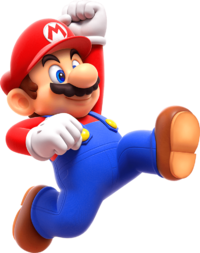
- “As you know, the primary action for mobile creatures is the jump, if you follow.”
- —Stuffwell, Mario & Luigi: Partners in Time
The generic jump is one of the most common moves in the Super Mario franchise, usually indicated by a pose with a raised fist and split legs.
In the original Donkey Kong game, Mario's jump can only dodge obstacles and collect items. Later games added the ability to hit platforms and blocks from below for beneficial results, and to stomp on many enemies and switches while falling. This promoted jumping to a primary method of attack and interaction in the franchise, in addition to a form of locomotion, giving it various purposes across genres.
In the early games, Mario keeps his legs split when landing on enemies to stomp them; in later games, Mario commonly lands on enemies by using his shoes.
Because Mario can jump in most games of the Super Mario franchise, only significant examples are mentioned.
History[edit]
Donkey Kong[edit]
In the original arcade version of Donkey Kong, Mario has to jump over the barrels that Donkey Kong throws at him. He can only jump high enough to leap right over the barrel, in contrast to the impossibly high jumps in the Super Mario Bros. series. If Mario lands on a barrel in the game, he dies. In the early concept of Donkey Kong, Mario originally was not able to jump. It was implemented when Shigeru Miyamoto and his team thought, "If you had a barrel rolling towards you, what would you do?"[1]
In the Game Boy version, Mario has a greater variety of moves related to jumping. If the player jumps then presses down on , Mario does a handstand. From the handstand position, Mario could perform high jumps and wide jumps depending on the situation. Mario could also backflip by walking and then immediately pressing the opposite direction and the jump button, resulting in him going high into the air backwards. Unlike all other 2D Mario titles, Donkey Kong also punishes the player for falling too far, resulting in Mario losing a life. This jump system has also been used in Mario vs. Donkey Kong.
Mario Bros.[edit]
In Mario Bros., jumping is the primary attack of Mario and Luigi and the only way to defeat enemies. By jumping from below to hit the platforms on which the enemies stand, the player can stun the enemies or turn them around. The enemies then have to be finished off with a kick. Unlike later games, stomping on enemies is deadly in Mario Bros. Because of this, the Shellcreepers have been changed to Spinies in all remakes of the game to remind players not to stomp on them.
Super Mario series[edit]
Since Super Mario Bros., jumping has been a much more integral part of the Super Mario franchise, and is no longer used solely to jump over gaps and enemies. In later games of the series, Mario and other playable characters use a greater variety of jump moves which can be used to reach certain areas or get bonus items from special blocks. These include the Spin Jump from Super Mario World, the Ground Pound first seen in Super Mario World 2: Yoshi's Island, and even the Double Jump, Triple Jump, and Wall Jump introduced in Super Mario 64.
Super Mario Bros.[edit]
Super Mario Bros. features various types of Brick Blocks which Mario can find coins in, as well as ? Blocks that contain Magic Mushrooms and Fire Flowers. To break these blocks, the player must jump while under them. Mario can also defeat enemies like Little Goombas and Hammer Brothers by stomping on them. Koopa Troopas are not defeated by the stomp, but hide in their Shells, which can then be kicked by the player. Hammer Brothers, Cheep-cheeps, fake Bowsers, and Bowser himself all jump in the game as well.
Super Mario Bros. 2[edit]
In Super Mario Bros. 2, jumps served a different purpose than in all other games, due to the game using the only slightly altered Yume Kōjō: Doki Doki Panic as its engine. The characters in the game could not defeat any enemies by stomping on them. Instead, they could stand on them and pick them up by pressing . Players could even land on Birdo's eggs and throw them at Birdo. Enemies and items could be picked up and thrown to knock out other enemies. This system has been carried over to Donkey Kong on the Game Boy.
Super Mario World[edit]
While the standard jump (or Regular Jump)[2] remains mostly unchanged in Super Mario World, Mario is also now capable of spin-jumping. It trades height for offense, as it can break blocks (as Super Mario) and destroy enemies that are usually more durable. It also allows Mario to bounce off certain enemies, notably those with spines, where he would usually take damage.
Super Mario World is the debut of Yoshi, a dinosaur-like creature Mario can ride. His jump is greater than Mario's, but it defeats enemies as quickly as the Spin Jump, and Yoshi even bounces on spiny enemies, too. While on Yoshi, Mario or Luigi can perform a Yoshi Boost[3] (also named Double Jump),[4] which gives him a second, higher jump off Yoshi. Doing so leaves Yoshi alone unless Mario or Luigi hops back onto him.
Super Mario World 2: Yoshi's Island[edit]
The playable appearance of Yoshi, Super Mario World 2: Yoshi's Island, introduces multiple aspects on top of the jump. By holding the jump button, Yoshi will Flutter Jump, which stalls him momentarily, allowing for careful landings and covering greater distances. Pressing down makes him Ground Pound, an offensive move that is stronger than landing on enemies. These are all new to the franchise, with Ground Pounding becoming a staple of Super Mario Bros. games, and Flutter Jumping being an iconic move of Yoshi's.
Super Mario Sunshine[edit]
In Super Mario Sunshine, Mario's jump can defeat most enemies. When using FLUDD's Hover Nozzle, Mario can float higher and longer. Additionally, if Mario jumps over a pit, his jumps are different.[citation needed]
Mario Kart series[edit]
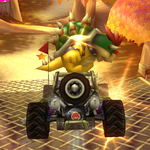
Throughout most games in the Mario Kart series, players can make a short hop to begin a drift. Super Mario Kart and Mario Kart: Super Circuit feature many narrow hazards that can be hopped over, such as puddles or cracks in the road. Otherwise, the series generally implements Dash Panels and ramps within courses to enable higher and farther jumps. Mario Kart Wii introduced tricks, which allow racers to perform stunts when jumping from ramps to receive a brief speed boost upon landing. In Super Mario Kart, Mario Kart 8 Deluxe, and Mario Kart Tour, the Feather (exclusive to Battle Mode in the latter two games) allows players to jump over obstacles and racers.
As of Mario Kart Tour, Mario Kart: Double Dash!! is the only game in the series where racers cannot hop. Drifting is still executed in a similar fashion to the other games.
Super Mario RPG: Legend of the Seven Stars[edit]
In Super Mario RPG: Legend of the Seven Stars and its remake, the Jump is a special move that requires 3 Flower Points. It does additional damage as a Timed Hit, and its power increases with the Jump Shoes. Mario can use this move from the beginning of the game. Mario's jump is also used by many characters in the game to verify his identity. Everyone also seems to think of it as his most defining characteristic.
Mario's Jump, along with Super Jump and Ultra Jump, are designated with the "Jump" element, one of the four elements assigned to Special attacks in the game (the others being Fire, Lightning, and Ice). Spiky enemies are restistant to Jump attacks unless Mario equips the Jump Shoes, in which case he can damage them. Mario is the only character in the game that can use attacks with this property.
Mario Party series[edit]
In the Mario Party series, characters usually jump to hit Dice Blocks. Characters can also jump in various minigames. Sometimes characters can jump on their opponents to stun them temporarily (and to jump higher in a few minigames). In some minigames, such as Coin Cache, stunned characters have a lower jumping ability.
Paper Mario series[edit]
Jumping is present in every installment of the Paper Mario series.
In Paper Mario and Paper Mario: The Thousand-Year Door, jumping is Mario's primary attack he can use from the beginning of the game. It can be used to defeat any kind of generic enemy like the Goombas, but some enemies like the Spiked Goombas prevent jump attacks with spikes, and the player then has to use the Hammer attacks instead. Jumping is also used on the overworld for platforming elements. In both games, Mario can increase his jump power and abilities with the Super Boots and the Ultra Boots; Super Boots make each hit have a power of 2, while Ultra Boots make each hit have a power of 3. Doopliss also uses Mario’s jump attack in battle when he copies Mario.
In Super Paper Mario, all four characters have the ability to jump on foes as their primary means of attack.
Paper Mario: Sticker Star features multiple Jump stickers that can be used in battle, each with various strengths. There are seven different types of Jumps, each with their own variations: the Jump, Iron Jump, Hopslipper, Infinijump, Line Jump, and Clone Jump. All of these types except the Infinijump and Clone Jump reappear as cards in Paper Mario: Color Splash, along with a new variation, the Spin Jump.
Mario & Luigi series[edit]
Mario & Luigi: Superstar Saga / Mario & Luigi: Superstar Saga + Bowser's Minions[edit]
Mario & Luigi: Superstar Saga used the same concept for jumps as the Paper Mario series. In addition, the player controls both Mario and Luigi simultaneously using ![]() , with one brother in tow following the other's movements. Each brother has their own corresponding button –
, with one brother in tow following the other's movements. Each brother has their own corresponding button – ![]() for the leading brother and
for the leading brother and ![]() for the following brother – and it is necessary to use both to get both brothers over pits. On the overworld, Mario and Luigi could also perform the High Jump and the Spin Jump to reach higher areas. In combat, Mario and Luigi can jump on their enemies to attack, with their attack's damage being boosted by pressing the respective brother's button (the
for the following brother – and it is necessary to use both to get both brothers over pits. On the overworld, Mario and Luigi could also perform the High Jump and the Spin Jump to reach higher areas. In combat, Mario and Luigi can jump on their enemies to attack, with their attack's damage being boosted by pressing the respective brother's button (the ![]() button for Mario and the
button for Mario and the ![]() button for Luigi) upon landing. There are also enemies that cannot be jumped on, such as spiked enemies, and will counter if this happens, inflicting damage on the attacking Bro. and causing him to jump back to his spot in pain. Many Bros. Attacks also use jump moves, especially Splash Bros., Bounce Bros., and Swing Bros.. Jump attacks are stored in the Solo Command Block, which displays a single face with the word "Solo" beneath it. Jumping is also used for defense, typically to avoid attacks traveling on the ground such as the corrupted Queen Bean's shockwave slam attack. Mario & Luigi: Superstar Saga + Bowser's Minions retains this, although jumping on an enemy that cannot be jumped on will cause the text "Too bad..." to appear.
button for Luigi) upon landing. There are also enemies that cannot be jumped on, such as spiked enemies, and will counter if this happens, inflicting damage on the attacking Bro. and causing him to jump back to his spot in pain. Many Bros. Attacks also use jump moves, especially Splash Bros., Bounce Bros., and Swing Bros.. Jump attacks are stored in the Solo Command Block, which displays a single face with the word "Solo" beneath it. Jumping is also used for defense, typically to avoid attacks traveling on the ground such as the corrupted Queen Bean's shockwave slam attack. Mario & Luigi: Superstar Saga + Bowser's Minions retains this, although jumping on an enemy that cannot be jumped on will cause the text "Too bad..." to appear.
Some enemies and bosses resist jump or hammer attacks, even if they are spiky.
Mario & Luigi: Partners in Time[edit]
In Mario & Luigi: Partners in Time, the jump command was identical to how it was in Mario & Luigi: Superstar Saga, however, the piggyback jumps with Baby Mario and Baby Luigi increased the number of jump commands in-battle; the players must press the baby's button (![]() for Baby Mario and
for Baby Mario and ![]() for Baby Luigi) before the adult's to deal extra damage. Jump attacks now have their own command block, which displays a white upward arrow against a red background. Jumping is used for defense as well. The Spin Jump returns, and later on the bros learn the Baby Spin move which allows them to Spin Jump into the babies to launch them even further upwards and makes it possible for them to cross large gaps along with the adult bros. In the overworld, Mario now always leads before Luigi, so Mario always uses
for Baby Luigi) before the adult's to deal extra damage. Jump attacks now have their own command block, which displays a white upward arrow against a red background. Jumping is used for defense as well. The Spin Jump returns, and later on the bros learn the Baby Spin move which allows them to Spin Jump into the babies to launch them even further upwards and makes it possible for them to cross large gaps along with the adult bros. In the overworld, Mario now always leads before Luigi, so Mario always uses ![]() while Luigi uses
while Luigi uses ![]() . Like Mario and Luigi, the player controls both Baby Mario and Baby Luigi simultaneously using the
. Like Mario and Luigi, the player controls both Baby Mario and Baby Luigi simultaneously using the while they are separated from their older selves, with Baby Mario leading before Baby Luigi. The two babies also have their own corresponding button -
![]() for Baby Mario and
for Baby Mario and ![]() for Baby Luigi.
for Baby Luigi.
Mario & Luigi: Bowser's Inside Story / Mario & Luigi: Bowser's Inside Story + Bowser Jr.'s Journey[edit]
In Mario & Luigi: Bowser's Inside Story and Mario & Luigi: Bowser's Inside Story + Bowser Jr.'s Journey, jumping in battles works similar to how it did in Mario & Luigi: Partners in Time when the adult brothers are with their infant counterparts; Mario and Luigi can perform two jumps with a well-timed action command, dealing twice the damage to enemies. Certain attacks also have to be jumped over. In the overworld, jumping functions the same as it did in Mario and Luigi: Partners in Time, though there are also 2D side-scrolling segments that take place inside Bowser's body, where the jumps use the mechanics of Mario & Luigi jumping in a typical Super Mario Bros. setting.
Mario & Luigi: Dream Team[edit]
In Mario & Luigi: Dream Team, the Jump attacks for Mario and Luigi are identical in gameplay to the ones in Mario & Luigi: Bowser's Inside Story. In the Dream World, when Mario is combined with Dreamy Luigi, successful Jump attacks cause several Luiginoids to fall on to surrounding enemies after Mario attacks for extra damage. The Jump command block shows a Boot in this game, rather than an arrow; however, arrows still serve as the symbol for the jump defense. Luiginary Ball is an Luiginary Attack which does not involve the brothers jumping, but deals extra damage to enemies weak to jumps all the same. Jump attacks definitionally deal damage using the boots. Jumping on a spiked enemy will cause the text "Miss..." to appear as the attacker jumps back to his spot in pain.
The Jump attack is also used during the Giant Battles by Giant Luigi. Luigi bends down and the player must wait until Luigi flashes and spreads his arms to slide up quickly on the Touch Screen. Perfect timing allows Luigi to land firmly on the target and perform a second jump on them if the player succeeds in repeating the command. Perfect timing with both jumps yields an Excellent! rating, perfect timing on only one yields a Great! rating, sliding up at the wrong time results in a Good! rating and not sliding up at all results in an OK! rating.
In the overworld, this game uses the Jump field action the same way as the previous two games, and continues to feature the Spin Jump move. Ball Hop is a new move where the Bros. curl into a ball to bounce forward, leaping higher than normal. The Dream World is a 2D space, much like Bowser's body. Spin Jump and Ball Hop are not used in the Dream World, as Dreamy Luigi instead uses Luiginary Works to get past obstacles. Luiginary Works that float in the background can jump to cosmetic effect; if the Luiginary Work does not move (i.e. the tree slingshot and the pinwheel), Luigi will still raise his eyebrows as though jumping, but will not actually move. The Luiginoid Formation is a Luiginary Work that summons Luiginoids to form one of three shapes. The stack shape can jump. It can also crouch down to perform a high-flying Spring Jump that breaks blocks above it. The cone shape can Hover Spin as its jump, which falls slowly and can be repeated in air to keep most of its height.
As in other games, the Mario Bros. sometimes prove their prowess to other characters by jumping.
Descriptions[edit]
- Mario - Press the A button as you land to jump again. Time two jumps for an Excellent!
- Luigi - Press the B button as you land to jump again. Time two jumps for an Excellent!
- Giant Luigi - Charge up for extra oomph!
Mario & Luigi: Paper Jam[edit]
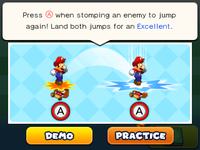
In Mario & Luigi: Paper Jam, Mario and Luigi's jumps remain the same, but Paper Mario is unique due to having as his jump button. In battle, Paper Mario and his copies can jump on enemies many times depending on how many copies he has. The Jump defense is also used here to avoid low attacks, and Paper Mario can also float by flapping his arms, allowing Paper Mario to avoid taller or longer attacks for his version of the jumps. The Papercrafts can also perform a jump move to stomp on enemies, though the player has to retrieve the Papercraft after jumping.
Mario & Luigi: Brothership[edit]
Mario & Luigi: Brothership has a mechanic where when jumping on enemies to attack in combat, the Bro. whose turn did not come yet will walk up and can give his brother a boost to attack an enemy again. Additionally, jumping on a spiny enemy will cause the attacking Bro. to grab his foot in pain after the attack. The "Miss..." graphic that appears when jumping on a spiked enemy is now light-gray in color.[5]
Luigi's Mansion series[edit]
Luigi's Mansion: Dark Moon[edit]
In Luigi's Mansion: Dark Moon, Luigi can jump while he is sucking up a ghost to avoid attacks from other ghosts. This is executed by pressing the button while using the Poltergust 5000 to suck up the ghost.
Luigi's Mansion 3[edit]
In Luigi's Mansion 3, Luigi and Gooigi can jump by using the Burst move. Mario is also seen using his jumping abilities, such as the Wall Jump and Side Somersault, to scale The Last Resort after Luigi defeats Hellen Gravely and rescues him.
Super Smash Bros. series[edit]
- See also: Double Jump (airborne)
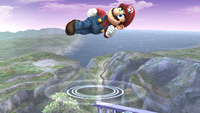
In the Super Smash Bros. series, a jump can be performed by all characters. Each character has a different jump height and speed. A major mechanic in the series is that players can jump again while airborne, and some characters can do so multiple times. Also, Mario, Luigi and Dr. Mario's Super Jump Punch is executed similarly to the conventional jumps in the Super Mario games.
Profiles[edit]
Super Mario Bros. 3[edit]
- Wii Virtual Console manual description: Press
 to jump, or hold it to jump higher. When in the water, press up on
to jump, or hold it to jump higher. When in the water, press up on  and
and  to jump out of the water.
to jump out of the water. - Wii Virtual Console manual description (Super Jump): Press
 when landing on an enemy to jump even higher.
when landing on an enemy to jump even higher.
Super Mario Land[edit]
- Virtual Console manual description: Press
to jump. To jump higher, press and hold
or press
while running. You can adjust the direction of the jump by pressing
while in the air.
Super Mario Land 2: 6 Golden Coins[edit]
- Virtual Console manual description: Press
to jump up. Use
to adjust the height and trajectory. You can defeat many enemies by jumping on them.
Super Mario RPG: Legend of the Seven Stars[edit]
- Menu description:
- Flower Used 3
- Mg. Power 25
- Stomp foes! Press "Y" just before hit!
Super Mario RPG (Nintendo Switch)[edit]
- Battle menu description: Stomp foes! Push
just before the hit!
Mario & Luigi: Bowser's Inside Story[edit]
- Instruction manual description (overworld; basic actions): Hit blocks and other things from below, and jump while moving to climb up platforms. When you're in the water, you can swim.
- Instruction manual description (overworld; crossing gaps): Press
 and
and  at the same time while moving with
at the same time while moving with to jump across gaps.
- Instruction manual description (battle): If you time your jump attack right, you can stomp an enemy twice.
Super Mario 3D Land[edit]
- North American website bio: Mario's iconic jump is a vital move to master in every stage.
New Super Mario Bros. 2[edit]
- European website bio: Press the A or B Button to jump, hold the button down to jump a little higher, or jump while dashing to go higher still! To perform Double Jumps or Triple Jumps, dash and jump twice or three times in a row. The timing is pretty exact, but you can make some mighty leaps!
Mario & Luigi: Dream Team[edit]
- Instruction manual description (overworld): Jump to hit blocks from below or to reach higher places.
- Instruction manual description (battle): Press the action button just before you land a jump on an enemy to attack twice.
Mario & Luigi: Paper Jam[edit]
- Instruction manual description (overworld): Jumping can help you reach higher places or hit blocks.
- Instruction manual description (battle): If you press the action button just before you land on an enemy, you'll jump off and repeat the action for additional damage.
- Instruction manual description (Paper Mario): If you press
when a Paper Mario copy stomps on an enemy, the next copy in line will perform a stomp. This repeats until the copies run out or you miss a button press.
Paper Mario: The Thousand-Year Door (Nintendo Switch)[edit]
- Battle description: Attack enemies by stomping on them.
Gallery[edit]
- For this subject's image gallery, see Gallery:Jump.
Names in other languages[edit]
| Language | Name | Meaning | Notes |
|---|---|---|---|
| Japanese | ジャンプ[?] Janpu |
Jump | |
| Chinese | 跳[?] Tiào |
Jump | |
| Dutch | Springen Sprong[?] |
To jump Jump |
|
| French | Sauter Saut[?] |
To jump Jump |
|
| German | Springen Sprung[?] |
To jump Jump |
|
| Italian | Salto[?] | Jump | |
| Korean | 점프[?] Jeompeu |
Jump | |
| Portuguese | Saltar[?] | To jump | |
| Salto[?] | Jump | ||
| Russian | Прыжок[?] Pryzhok |
Jump | |
| Spanish | Saltar Salto[?] |
To jump Jump |
References[edit]
- ^ Iwata Asks - New Super Mario Bros: Volume 1 Nintendo. Retrieved June 6, 2010.
- ^ Super NES Nintendo Player's Guide, page 15.
- ^ Mario Mania Nintendo Player's Guide, page 43.
- ^ Super NES Nintendo Player's Guide, pages 13 and 15.
- ^ https://www.youtube.com/watch?v=-dTE1FEvd6U
- Jumps
- Donkey Kong moves
- Donkey Kong (game)
- Donkey Kong Jr.
- Donkey Kong 64
- Donkey Kong Country
- Donkey Kong Country 2: Diddy's Kong Quest
- Donkey Kong Country 3: Dixie Kong's Double Trouble!
- Donkey Kong Country Returns
- Donkey Kong Country: Tropical Freeze
- Donkey Kong Land
- Donkey Kong Land 2
- Donkey Kong Land III
- Luigi's Mansion: Dark Moon
- Mario + Rabbids Kingdom Battle
- Mario & Luigi: Bowser's Inside Story moves
- Mario & Luigi: Dream Team moves
- Mario & Luigi: Paper Jam moves
- Mario & Luigi: Partners in Time moves
- Mario & Luigi: Superstar Saga moves
- Mario Bros.
- New Super Luigi U
- New Super Mario Bros. 2
- New Super Mario Bros. U
- New Super Mario Bros. Wii
- New Super Mario Bros.
- Nintendo Land moves
- Paper Mario special moves
- Paper Mario: Color Splash
- Paper Mario: Sticker Star
- Paper Mario: The Thousand-Year Door moves
- Super Mario 3D Land
- Super Mario 3D World
- Super Mario 64
- Super Mario 64 DS
- Super Mario Advance 4: Super Mario Bros. 3
- Super Mario Bros. 2
- Super Mario Bros. 3
- Super Mario Bros.
- Super Mario Bros.: The Lost Levels
- Super Mario Galaxy
- Super Mario Galaxy 2
- Super Mario Land
- Super Mario Land 2: 6 Golden Coins
- Super Mario Maker
- Super Mario Maker 2
- Super Mario Odyssey
- Super Mario RPG: Legend of the Seven Stars moves
- Super Mario Run
- Super Mario Sunshine
- Super Mario World
- Super Mario World 2: Yoshi's Island
- Super Paper Mario moves
- Super Princess Peach
- Super Smash Bros.
- Super Smash Bros. Brawl
- Super Smash Bros. for Nintendo 3DS / Wii U
- Super Smash Bros. Melee
- Super Smash Bros. Ultimate
- Super Smash Bros. series moves
- Virtual Boy Wario Land
- Wario moves
- Wario Land: Shake It!
- Wario Land: Super Mario Land 3
- Wario Land 3
- Wario Land 4
- Wario Land II
- Wario World
- Yoshi moves
- Yoshi Touch & Go
- Yoshi's New Island
- Yoshi's Island DS
- Yoshi's Island: Super Mario Advance 3
- Yoshi's Story
- Yoshi's Woolly World
- Elements
